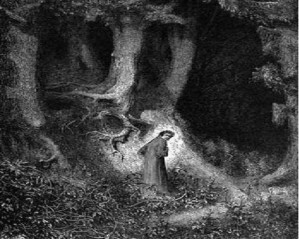I have been thinking, wondering, and contemplating these words, sacred and profane, for about 10 years, maybe longer. I’ve been struck with the sense that our understanding of these concepts falls so far short of the richness, wisdom, and daily guidance they could bring. We use them flippantly and mindlessly in a very narrow religious sense. For instance, using sacred to refer to certain places that look religious, or certain times and rituals initiated by a religious hierarchy. And we use the word profanity as something that refers to words, especially the use of “God” or "Jesus" to express our anger as a curse, that are self defined family by family, church by church, culture by culture.
The deeper I go, the bigger these words get. The depth and breadth of these two words seem to go as deep and wide as my mind can go. Actually, more and more, they have guided me in life; daily, moment by moment to the point that I think we as a society unconsciously and unintentionally live lives full of profanity interwoven throughout every day.
Within each moment lies life and death, sacred and profane, the holy and the desecrated.
In 2011, I wrote a blog post about these words (
https://ronirvine.wordpress.com/2011/07/03/the-sacred-and-the-profane/) as they took root in the silence of a Quaker Worship Meeting where we sit for an hour in silence. In those Meetings there was what they called “vocal ministry” when a person in the meeting might stand and speak a word of inspiration that was deeply stirring them. It was one of the few times I spoke during the Meeting. I remember vocalizing that I had a sense of this space being sacred. There was a deep sacredness that is not there all the time. But at certain points over time, the group gets a sense of what is called “gathered worship" where we all feel a sacredness within and between us enveloping us with Light, warmth, peace, and connection. I wondered out loud, in my vocal ministry, what that was. Was it something that comes and goes within me or is it something anchored in (and beyond) the time and place of the Meeting for Worship? Simultaneously, I began wondering about profanity and what that might really mean in a deeper sense. I think that apart from the silence, none of this would have occurred to me. Much of my thinking was still caught up in dogma, my past conditioning and what I've been told. Those voices kept speaking to me about the sacred and profane being anchored in space and time. But I could tell there was something new emerging that, as so often happens, I could not have understood earlier in my formation because I did not yet have the discernment and experience to grasp such things.
For the last 13 years, I’ve been blogging my journey, sorting through the trash and treasures, the conditioning that was cluttering my mind. But during that time, I had a very religious, Christian approach to my understanding, my thinking, and my writing. I guess that is because I strongly identified as a Christian and had done so for almost 50 years. In the last couple of years, I have felt impelled to let go of all of the dogmatic thinking that came with my cultural Christianity and conditioning. As part of this concerted effort of sorting things out and going deeper, I started a new blog, this one (
https://livingwithopenhands2.blogspot.com/), where I can speak more freely without offending my religious blog followers, Christian friends, and family with my honesty.
Now as I look back, what I wrote 10 years ago was both profound and thin, deep and shallow. I have grown way past that thinking. And something I noticed was that the words in that post were in some ways profane. My use of “god” is something that I have gradually lessened since then because the word god has been made meaningless in this day and age, in the context within which I exist. Religious language and dogma blocks quality conversations, deeper thinking, and greater understanding. People use it flippantly and mindlessly, or as a weapon for violence, or they use it to beat others into submission or into thinking like me. Through the process of sorting out the sacred and the profane in my life, my eyes have opened to how Christians throw around religious language (Christianese).
Words have been weaponized by Christians to convert the lost, to manipulate, to create guilt, and to brag about their own righteousness or say a righteous public prayer. Some of the flippant use of Christianese is what I see as permeating almost every conversation with words and phrases like “praise god”, I’m praying for you, bless you, Jesus this or Jesus that. God this or God that. The sun is out, "praise God," it is cloudy, "pray for the sun to come out," someone is sick, "I'll pray for healing," someone dies, "he is in a better place," "God's got a plan," and on and on. I could take a notepad to most gatherings of Christians and get a slew and slurry of religious language. But why would a Christian need to use all of these religious words and phrases with those that are already "saved" or converted? And why would a Christian use religious language that is often offensive or at least meaningless to those that are not converted Christians. And why convert anyone since it requires that we dominate others that are better, think better, believe better, than them? Christianese is frivolous use of language that is supposed to be used carefully and thoughtfully in meaningful contexts. Anytime faith and religion is used to dominate and control rather than uplift and inspire others, it has become weaponized and violent, profane and desecrated.
For me, profanity means using something sacred for mundane or meaningless uses, usually we overuse it without even realizing it. Unconscious usage of Christianese I think is also included under profane as well as any dogmatic (I'm right... you're wrong or I know... and you don't or repent and act like me) language that looks down on others; discriminating, judging, labeling in ways that elevate myself or my perfect religion. Anytime we dominate others in this way, it is a form of violence and violence is a form of profanity. For me, this is the mindless use of language that is profane. It assumes a superior stance and that others need to hear your dogma because of your superiority. And if the attempt at conversion is done with one’s language then one’s hands can be washed of any guilt of that person being lost and going to hell. "They should have listened to me and my righteousness."
I long for simple human conversations without trauma-trigger words giving testimony to the righteousness of self or the unrighteousness of the other. Even well-intentioned, damage is done whenever another person is oppressed through power and domination, even if it is an illusion or unintentional. Oppression occurs even when a person feels oppressed or preached at.
For me, whenever I use the word god in my writing, I feel a sense of profanity. I assume that the person that might read what I write will automatically know what I mean. We throw that word around like we think we know what it means and like we think we know how others understand it, and that they understand it just like me. And yet words can never contain that which is sacred and boundless, infinite and limitless. Yet we think we can flippantly label this??? Presumptuous to say the least. Profane to say it more clearly.
These two things keep coming to mind for those that do believe in God and think that God can be contained in words:
St. Augustine (354 - 430 AD) has this to say:
“What then, brethren, shall we say of God?
For if thou hast been able to understand what thou wouldest say, it is not God.
If thou hast been able to comprehend it, thou hast comprehended something else instead of God.
If thou hast been able to comprehend him as thou thinkest, by so thinking thou hast deceived thyself.
This then is not God, if thou hast comprehended it; but if this be God, thou has not comprehended it.”
And Thomas Merton (1915 - 1968) has this to say:
“If nothing that can be seen can either be God or represent Him to us as He is,
then to find God we must pass beyond everything that can be seen and enter into darkness.
Since nothing that can be heard is God, to find Him we must enter into silence.”
(Seeds of Contemplation, p. 131)
Note: I find it very interesting that the two main traits of God are his silence and his invisibility, which does not lend itself to any kind of personal relationship.
I used to seek to have religious conversations for many years. But I'm finding that as I deepen my understanding, I find that religious dogma and talk get in the way of quality conversations; connecting with others on a deeper, human, heart to heart level. I learned this more and more as I became friends with people from an interfaith group (Buddhist, Pagan, Wiccan, Hindu, Quaker). I've always thought I sought out diversity in so many ways (racial, ethnic, economic, disability, etc), but I started to see that there is more than just visible differences. I needed to expand my diversity to people that think and believe differently, invisible diversity. That's a form of diversity that I needed. It has been enriching to get to know many atheists,
nontheists,
ignostics,
agnostics,
theological non-cognitivists, and skeptics. Too often dogma needs to be cleared away in order to have conversations that matter about things of the heart with all people... because all people matter.
The link below is a post where I tried to describe further what I am referring to here. Too often we create god in our image or we label things that are real but beyond our understanding with the word “god”. God has become a default or knee-jerk label. And yet again, this is a perfect example of profanity; using our words to talk about that which we think we know but cannot know. I think the bible refers to it as idolatry for Christians.
https://livingwithopenhands2.blogspot.com/2019/05/the-image-of-god.html
If we dive in further, the words sacred and profane broaden and deepen, giving more and more guidance for daily living. I suggest this understanding.
A Sacred Life = making the ordinary (in all of life’s moments) sacred. (mindfulness, awareness, appreciation, wonder, awe)
A Profane Life = making the sacred (in all of life’s moments) ordinary. (thoughtlessness, apathy, familiarity, mundane, taken for granted, desecrated)
I think that the sacred and the profane lie dormant in each situation and opportunity.
The sacred and the profane go far beyond just time and space though.
I think this includes all of our relationships in life:
with people, with ourselves, with the earth, and with all that is greater than us.
I think we are in the process or habit of desecrating these relationships, all of which are meant to be sacred.
A good example is our interactions within our family unit. Are we fully engaged during every interaction with our spouse or our children? Or are we tuned out, preoccupied, apathetic; creating profanity in our wake.
All we have is this present moment, nothing else. The past is gone. The future is coming. But the only thing we have any control over is here and now. And yet, our thoughts are mostly occupied with the past (regret, guilt, shame) and the future (worry, desire, expectation). Our heads are full of stories and voices, illusions and fictions.
Whenever we do that, we miss the present moment. And when we miss it, it is gone forever. THIS is in many ways, the ultimate profanity. We throw away or let slip away all that which is sacred; casting pearls to the swine.
In my post from 2011, I continued to ask these questions that I am still seeking an answer:
Is the sacred something out there… or something within? Maybe the sacred is the fire that gives light and meaning to the ordinary. Maybe the sacred is something that I bring to life; to every encounter, to every moment, to every word, to every action, to every reaction. Maybe the sacred calls to me and demands of me to create meaning in each day, each hour, each minute, each breath. Maybe the sacred is a deep calling on my life to live out the purpose that is innate, using the gifts I came here with… making a difference.
Not missing everything...
Not missing anything…
Being fully present
Identifying purpose
in each moment,
each situation,
each encounter;
… infusing each with the fire of the sacred.
In every encounter we have in life with people or situations, we walk away changed. We continue on as a different person, for the better or not.
If the sacred is a way of identifying how I live my life, what I do with the ordinary things of life; then what is the profane?
Could it be that any time I disrespect or disregard the sacred, then I am demonstrating profanity; living out a desecration of life?
Is it possible that profanity (like violence) is much deeper than the religious sense of a swear word, using God’s name in vain, or talking bad about the church or the bible.
What about any time we violate the identity or integrity of another person? This is a definition of violence. This is simultaneously another iteration of profanity.
Could profanity be contained in a reaction? A look? An attitude? A thoughtless act? A turning away… from anything or anyone that I am called to pay attention to. A looking down on anyone that I deem lesser than me and my righteousness.
With new eyes, I now read these definitions:
Definition of SACRED
1: dedicated or set apart for the service or worship of a deity
2: devoted exclusively to one service or use (as of a person or purpose)
3. worthy of awe and respect
Definition of PROFANE
1. to
treat (something sacred) with abuse, irreverence, or contempt:
desecrate
2. to debase by a wrong, unworthy, or vulgar use
3. an act of violence: to violate the identity or integrity of self or others
Related to PROFANE
Synonyms:
abase,
bastardize,
canker,
cheapen,
corrupt,
debauch,
degrade,
demean,
demoralize,
deprave,
deteriorate,
lessen,
pervert,
poison,
debase,
prostitute,
subvert,
vitiate,
warp
Antonyms:
elevate,
ennoble,
uplift
The words that jumped out at me as synonyms of profane are not the extreme words but the subtle words: CHEAPEN and LESSEN.
I must weigh in my heart, each moment of each day, whether I am entering into that moment with sacredness or with profanity. Do I honor and value life and my purpose here or do I cheapen and lessen it???
Each moment of each day, I must choose the sacred or the profane, life or death, peace or violence.
In my life, is the sacred the fire, the passion, the light that gives life and purpose to EVERYTHING; EVERYWHERE, EVERYDAY? Or not?
“Oh love that fires the sun, keep me burning.” (Bruce Cockburn lyrics)
What if?
Over the past couple of years, I have become more and more nontheist. The word god and the concept of god has had less and less meaning for me in my life. It is nothing more than a label projecting human characteristics onto that which I do not and cannot understand. It is just not at all useful. The reason is that I believe that we use the label "god" to describe that which we cannot understand because we can't "not know". We use it so that we can speak and act like we do understand (which is a lie). I know that there is that which is greater that me. I know that there is an energy and force that not only is the creative force of the universe but also that holds the universe together. I know there are great mysteries and many things beyond my understanding but I believe that most people out of ignorance and often sheer laziness just plaster labels on those things that we cannot understand or that are different than us. We used to believe in the god of the river and the god of the storm, or Mother Earth, Zeus, Apollo, Ares, Mars, Venus, Pluto, because we were afraid of the power that we saw and felt better when we could label it, obey it, and worship it, just like we label people that are different; that have disabilities or are of different faiths, or ethnicities, or races. Labeling works to assuage our confusion or fears of the unknown, and has a very practical use at times, especially in the grocery store or even more so in the toilet paper aisle.
So... What if?
I think we label things we don't understand and I believe this is another form of profanity. We use labels meaninglessly because we refuse to take the time to go within and understand that which is available to us to understand; what I call "innerwork". What if there is a sacredness within each of us AND between us all AND throughout all of the universe??? What if god is the connection and we are just labeling something so great and beyond our understanding just so that we can feel better about our ignorance? What if we are creating god in our image and giving god all of the best of human characteristics (anthropomorphism) so that we do not fear god or so that we can always have that listening invisible friend that we have always longed for? What if the sacred is parallel to light and consciousness? These all exist outside of space and time, material objects and energy according to physics. What if it is out of this sacredness, this Light, this cosmic consciousness that all things come. What if this is the quantum field from which everything that is enfolded, unfolds? What if this is the Source? Our Ground of Being??? The Implicate Order (beyond and below all) within which is enfolded all that may unfold into the Explicate Order of time and space within which we live and move and have our being, here and now.
What if the Sacred means fulfilling the identity and purpose that we as human creatures individually and uniquely create; and living it out, here and now, in each action, in each reaction, in each interaction, in each relationship???


















